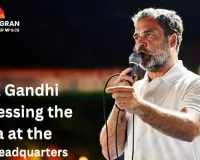H-1B Visa Crisis Fuels Reverse Brain Drain, Boosting India’s Startup Scene
Digital Desk
.jpg)
As of October 2025, the U.S. H-1B visa crisis, driven by President Donald Trump’s proposed $100,000 visa fee, is reshaping global talent flows and accelerating a reverse brain drain of Indian professionals. This policy, announced in September 2025, targets the H-1B program, which last year saw India claim 72% of 400,000 visas, powering tech giants like Amazon and Microsoft.
The fee hike up from $2,000–$5,000 has slashed applications by 40% since 2024 lottery reforms, with JPMorgan predicting 5,500 monthly job losses, largely impacting Indian tech and healthcare workers.
For Indian students like Sai Jagruthi from Hyderabad, U.S. dreams are fading. “The fee makes it impossible,” she told X, redirecting her AI master’s aspirations to India. Yet, this crisis is a boon for India’s startup ecosystem, now the world’s third-largest with over 100,000 ventures. The return of skilled professionals dubbed “digital nomads” is injecting global expertise into cities like Bengaluru and Mumbai.
These nomads, blending remote work with entrepreneurial zeal, are transforming India’s tech landscape. Priya Sharma, a former Google engineer, now drives Mumbai’s fintech scene with AI innovations, attracting $10 billion in venture capital in 2024. Similarly, Dr. Raj Patel, back from Boston, launched telemedicine startups in Hyderabad, leveraging global healthcare standards for India’s 1.4 billion market. IIT Madras Director V. Kamakoti sees this as ending the “learn-and-earn” abroad model, while Karnataka’s IT Minister Priyank Kharge emphasizes readiness for this talent influx.
Posts on X echo optimism, with Anupam Mittal urging, “Come back home!” India’s Global Capability Centers are projected to add 1 million jobs by 2030, fueled by nomads and offshoring. As America tightens immigration, India’s policies like nomad visas could turn this brain drain into a startup supernova, redefining global innovation.


.jpg)
18.png)



.jpg)


1.jpg)
